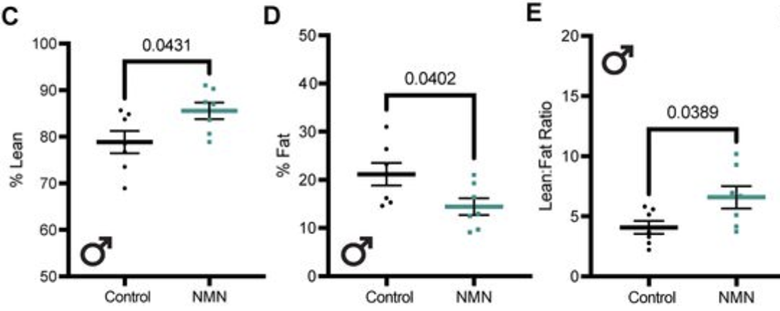This study examined the effects of long-term NMN supplementation on lifespan, healthspan, and metabolic health in male and female mice.
Key Points
- Increased median lifespan by 8.5% in female mice.
- Reduced frailty observed in both male and female mice.
- Enhanced metabolic health, particularly in male mice.
- Altered gut microbiome with increased levels of Anerotruncus colihominis.
- Modulated gene expression, delaying age-related changes.
Effects of NMN on Lifespan and Healthspan in Aging Mice
Mice were divided into two main groups based on sex and treatment:
NMN group: Received NMN in drinking water (~550 mg/kg/day).
Control group: Received regular water.
NMN was administered starting at 13 months of age and continued throughout the natural lifespan of the mice to assess long-term effects.
Assessments included regular evaluations of frailty, body weight, glucose levels, and metabolic flexibility.
Fecal samples were periodically analyzed to track changes in gut microbiome composition.
Muscle tissue was examined for gene expression changes related to aging and NMN treatment.
Sex-Dependent Lifespan Extension
Long-term NMN treatment resulted in an 8.5% increase in the median lifespan of female mice, and 7.9% increase in maximal lifespan.
This lifespan extension was not observed in male mice, suggesting that the benefits of NMN may be influenced by sex-specific differences in NAD+ metabolism.
“Interestingly, this is one of the few reported lifespan interventions, along with rapamycin, to have a greater effect in female than male wild-type aging mice, with many other interventions showing the opposite effect.”
Delayed Onset of Frailty
NMN administration was associated with a noticeable delay in the onset of frailty in both male and female mice, as evidenced by consistently lower frailty index scores over time.
Treated mice maintained more youthful physical attributes, such as intact fur color and normal breathing rates, compared to their untreated counterparts.
“Analysis of specific deficits indicated that NMN-treated male mice had, among other differences, reduced vision loss, less distended abdomen, maintained fur color, and better breathing rate than controls. In treated females, there was greater fur color maintenance, better coat condition, less kyphosis and less tail stiffening.”

This figure shows the frailty index (FI Score) for male mice (left) and female mice (right). Black dots are representative of the control group, green dots are mice in the NMN group. The mice in the NMN group showed significantly more resistance to frailty as the study progressed.
Improved Metabolic Health in Males
Male mice receiving NMN exhibited notable improvements in metabolic health, particularly in middle to later stages of life.
The treatment led to reduced weight gain, including protection against excessive fat accumulation, while also preserving lean muscle mass.
Additionally, NMN-treated males demonstrated greater metabolic flexibility, reflected in their ability to efficiently switch between carbohydrate and fat metabolism.
“Body composition analysis at 24 months of age using DEXA imaging showed that, for NMN-treated male mice compared to controls, this weight difference was a result of a reduction in fat gain, rather than a loss of muscle mass.”

This figure shows the lean and fat body mass percentages of male mice in the control and NMN groups. The NMN group showed significantly more lean (muscle) mass, significantly less fat mass, and a healthier lean to fat mass ratio.
Microbiome Modulation
NMN supplementation resulted in a significant and sustained increase in the abundance of Anaerotruncus colihominis, a beneficial gut bacterium known for its anti-inflammatory properties and association with longevity in humans.
This increase was consistent across both male and female mice.
“The largest observed shift in species abundance was observed for Anaerotruncus colihominis, a butyrate-producing bacterium in the Eubacteriaceae family, which has been shown to suppress neuroinflammation in mice and is enriched in human centenarians.”
No Increase in Cancer Risk
One recent concern with NAD+ boosters is the potential for increased cancer risk, as NAD+ is involved in cellular processes that could theoretically support tumor growth.
However, the study found no evidence of increased tumor burden or severity in either sex with long-term NMN treatment.
“In this study of wildtype mice, however, there was no effect of NMN on tumor counts or severity across any tissue. This is in agreement with whole blood count data, where we observed age and sex effects, but no effect of NMN treatment on white blood cell, red blood cell or platelet counts.”
Tissue-Specific Effects on Gene Expression
In male mice, significant changes were observed in the gene expression profiles of muscle tissue, aligning with markers of healthier aging and improved muscle function.
Female mice did not exhibit the same gene expression changes.
“Genes up-regulated with NMN and down-regulated with aging are enriched for neutrophil activation pathways, and the genes down-regulated with NMN (and up-regulated with aging) are enriched for protein ubiquitination and modification pathways.”
Conclusion
This study demonstrated that long-term NMN supplementation extended the median and maximal lifespan of female mice and delayed the onset of frailty in both sexes without increasing cancer risk.
Male mice treated with NMN showed enhanced metabolic health, with better maintenance of lean mass and improved metabolic flexibility, while both sexes experienced beneficial gut microbiome modulation.
The study also highlighted tissue-specific and sex-dependent effects of NMN on gene expression, particularly in muscle tissue, aligning with markers of healthier aging in males.
“Interestingly, these sex differences varied across tissues, with the plasma data suggesting greater overall NMN metabolism in females, the liver data suggesting greater salvage pathway metabolism for the males, and the muscle data suggesting no sex differences in NMN metabolism.”
